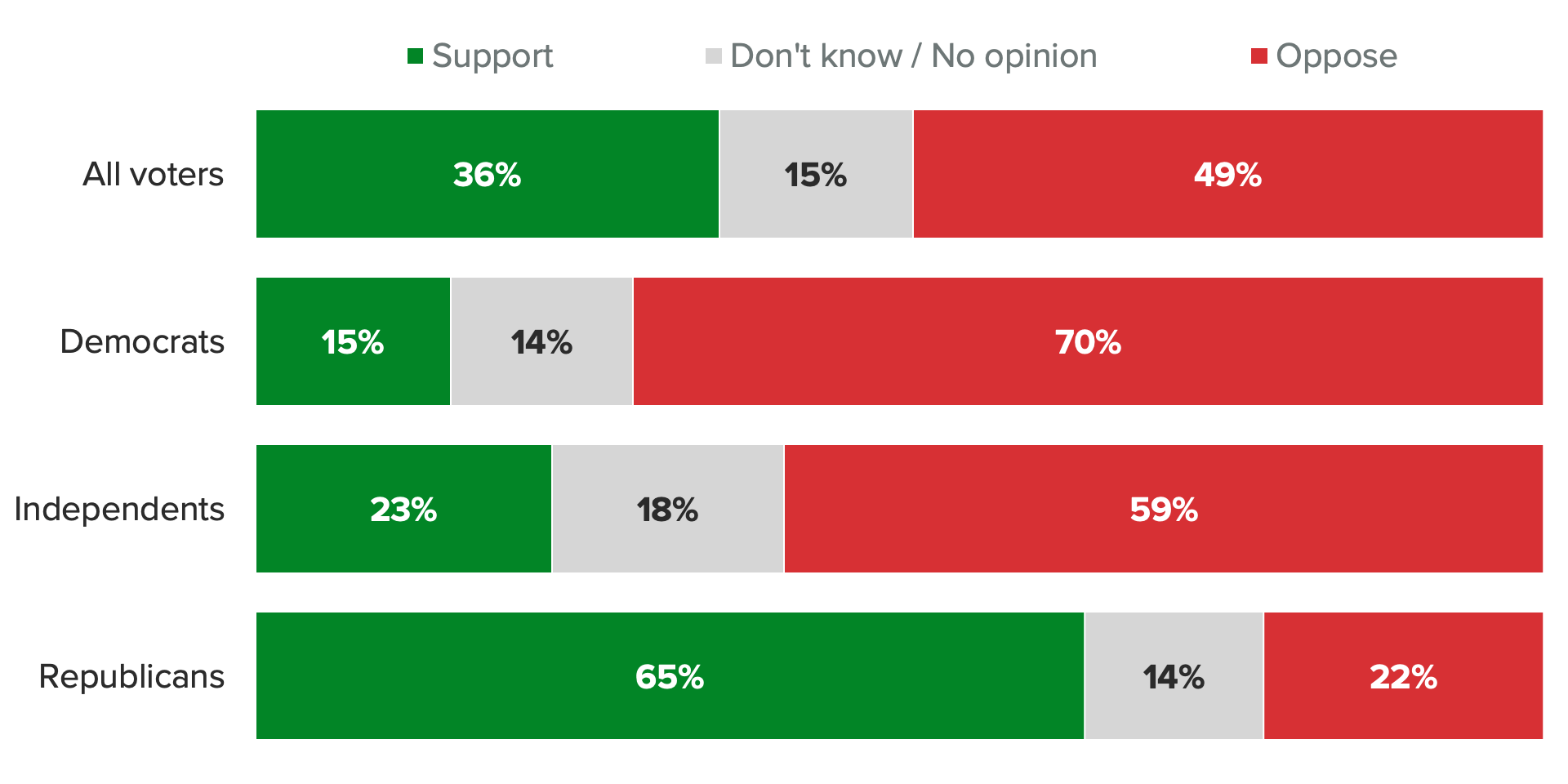The GOP’s Big Beautiful Bill Has a Bad Brand Despite the Popularity of Many of its Components

Data Downloads
Pro+ subscribers are able to download the datasets that underpin Morning Consult Pro's reports and analysis. Contact us to get access.
As Republicans in Congress work to advance President Donald Trump’s so-called One Big Beautiful Bill Act to extend their 2017 tax cuts and deliver on national security and energy policies, they’re facing a problem with public opinion: A number of the emerging bill’s provisions are popular with Americans, but the broader package is not.
Voters oppose GOP’s reconciliation package

Our May 16-19 survey shows that roughly half of voters (49%) oppose the legislative package, which was described as a proposal from Trump and Republicans in Congress to make changes to the tax system, increase funding for defense spending and border security and decrease funding for Medicaid and the development of renewable energy sources. That opposition includes comfortable majorities of Democrats and independents and 1 in 5 Republicans.
The public’s lack of support for House GOP’s reconciliation package is in spite of the popularity of several of its component parts — not only among Republican voters, but also the larger electorate.
Many pieces of the GOP's reconciliation plan are popular

Roughly 2 in 3 voters support Trump's plan to eliminate federal taxes on tipped income or overtime pay, similar to the share who back an expanded child tax credit. The majority of voters also support increased spending for the U.S.-Mexico border and the military, and plans to create newborn savings accounts.
Things get thornier when it comes to Medicaid, whose funding Democrats have been working to defend as Republicans seek out cost savings to pay for tax cuts. While half of voters support requiring low-income adults without children to work at least 80 hours per month to qualify for Medicaid, the same share oppose increasing out-of-pocket costs for some Medicaid beneficiaries.
The bottom line
The Medicaid issue clearly weighs on Trump, who told House Republicans on Tuesday, “Don’t f*** around with Medicaid,” according to an account by Politico. As we’ve shown you before, the bulk of voters would increase funding for Medicaid — as well as the Supplemental Nutrition Assistance Program (SNAP), another target of the bill — further highlighting the potential political peril facing the GOP in using these programs to fund their own “BBB.”
This problem is especially striking given the GOP’s trust deficit to handle health care, the costs of which remain a top priority in an electorate that hasn’t heard too much about Trump’s popular executive order urging the pharmaceutical industry to voluntarily reduce prices of prescription drugs.
Voters are twice as likely to say Washington should prioritize health care affordability than tax cuts

For the wide-ranging health care industry that’s boosted by government spending on care, all of this provides significant pressure points on vulnerable lawmakers — especially if the reconciliation package gets to the Senate in its current form, with voters more likely to back deficit spending over safety-net cuts to pay for tax cuts.
While Americans are OK with some tweaks to entitlement programs around the edges, as illustrated by the ample support for Medicaid work requirements, a narrative of funding cuts and increasing costs for recipients is difficult to defend. That makes it a political loser for a Republican Party that already has scarce political capital on health care.
It may be anathema to the vast majority of Republicans on Capitol Hill, but given the widespread backing for Trump’s populist tax proposals and growing support for tax increases on the wealthy within their own voter base, it’s clear that there is a much more popular way for the GOP to help pay for their signature legislation.
Eli Yokley is Morning Consult’s U.S. politics analyst. Eli joined Morning Consult in 2016 from Roll Call, where he reported on House and Senate campaigns after five years of covering state-level politics in the Show Me State while studying at the University of Missouri in Columbia, including contributions to The New York Times, Politico and The Daily Beast. Follow him on Twitter @eyokley. Interested in connecting with Eli to discuss his analysis or for a media engagement or speaking opportunity? Email [email protected].